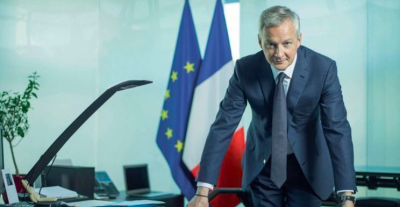France’s Finance Minister: “We’re waging an all-out economic and financial war on Russia”

All Global Research articles can be read in 51 languages by activating the “Translate Website” drop down menu on the top banner of our home page (Desktop version).
To receive Global Research’s Daily Newsletter (selected articles), click here.
Visit and follow us on Instagram at @globalresearch_crg and Twitter at @crglobalization.
Today, the dangers of military escalation are beyond description.
What is now happening in Ukraine has serious geopolitical implications. It could lead us into a World War III scenario.
It is important that a peace process be initiated with a view to preventing escalation.
Global Research condemns Russia’s invasion of Ukraine.
A Bilateral Peace Agreement is required.
French Finance Minister Bruno Le Maire declared an “all-out economic and financial war” against Russia for launching its military operation against Kiev last week. It is hoped that such an economic war will ‘punish’ Russia – but shortly after making his comment, Le Maire was quick to change his rhetoric after probably being given a stern warning from within the Champs-Élysées to not make bombastic comments that intensifies tensions and could actually lead to war between Russia and NATO.
Responding to Moscow’s decision to go to war with Ukraine, Washington and its closest allies have imposed a string of sanctions aimed against Russia’s central bank, government officials (including President Vladimir Putin and Foreign Minister Sergey Lavrov), and barred some Russian banks from the SWIFT international payments system.
When describing the sanctions, Le Maire said they are proving to be “extremely effective.” However, it was his next comments that raised eyebrows as he told France Info radio that:
“We’re waging an all-out economic and financial war on Russia. We will cause the collapse of the Russian economy. The Russian people will also pay the price.”
This of course is extremely alarming as he effectively revealed the intention to impoverish more than 140 million Russian citizens without considering that Moscow has its own retaliatory measures that will also hurt the average European citizen. Le Maire later clarified to AFP that he had misspoken and that the term “war” was not compatible with France’s efforts to de-escalate tensions surrounding the Ukraine conflict, adding: “We are not in a battle against the Russian people.”
This ‘clarification’ was of course made after former Russian Prime Minister and President, Dmitry Medvedev, who is now the deputy Chair of the Security Council of the Russian Federation, chillingly tweeted:
“Watch your tongue, gentlemen! And don’t forget that in human history, economic wars quite often turned into real ones.”
Today, some French minister has said that they declared an economic war on Russia. Watch your tongue, gentlemen! And don’t forget that in human history, economic wars quite often turned into real ones
— Dmitry Medvedev (@MedvedevRussiaE) March 1, 2022
For this reason, the Kremlin said on Tuesday that it was placing temporary curbs on foreigners seeking to remove their investments from the country, thus stopping an investor exodus driven by the sanctions which are aimed at shutting out major banks from the international payments system and capital controls choking off money flows.
What the Europeans do not realize is that Moscow sees this current crisis as an existential battle for survival. When Putin announced on TV his “special military operation,” he warned:
“To anyone who would consider interfering from the outside – if you do, you will face consequences greater than any you have faced in history.”
Recirculating in western media after this statement was Putin’s comment in a 2018 documentary:
“…if someone decides to annihilate Russia, we have the legal right to respond. Yes, it will be a catastrophe for humanity and for the world. But I’m a citizen of Russia and its head of state. Why do we need a world without Russia in it?”
Returning to the situation in Ukraine, Putin said at a meeting with businessmen that there was no reason to destroy a system which they live in, unless Russia were to be excluded from it. If the Europeans wanted to destroy the Russian economy and impoverish millions of Russian citizens, it cannot be excluded that Moscow with a touch of a button can turn off the gas supplies and bring the entire continent’s industry and economy to a halt – while civilians freeze.
This of course would completely destroy the Russian economy at the same time, but from Moscow’s perspective, why would they continue providing energy to a bloc that has already declared an “all-out economic and financial war.” It is extremely curious that the EU believes that Moscow would not make any retaliatory measures, measures that would spell bad news for European citizens. This is especially critical as it seemingly appears that European leaders and decisionmakers are completely naïve to the responses and retaliations that Russia can make.
For now, gas to Europe from Russia via Ukraine is flowing at full capacity. This accounts for at least $1 billion a day to the Russian economy, and threatening to end this will likely be considered a casus belli. With Russia’s nuclear forces already on alert, it remains to be seen whether the EU will pursue an “all-out economic and financial war” against Russia.
*
Note to readers: Please click the share buttons above or below. Follow us on Instagram, @globalresearch_crg and Twitter at @crglobalization. Forward this article to your email lists. Crosspost on your blog site, internet forums, etc.
Paul Antonopoulos is an independent geopolitical analyst.
Featured image is from archyde.com

